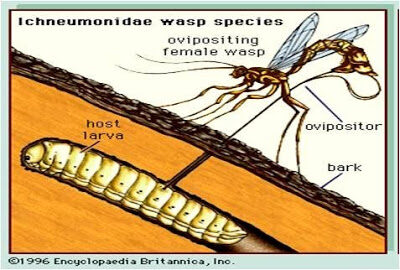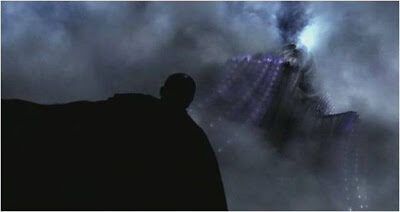Charles Darwin famously quipped about the sort of book that “a Devil’s Chaplain might write.”
I wished to focus on his imagining what the Devil’s Chaplain would write about the “low and horridly cruel works of nature.”1
It seems to me that it indeed would only be a Devil’s Chaplain who could write such a book (or conversely an Unfallen Angel’s Chaplain).
The Devil’s Chaplain would premise estimations as to what is “horridly cruel works” upon the very fact of being a Devil‘s Chaplain. The fact of being aware of absolute good, benevolence or ethics is what would make the Devil’s Chaplain aware of, that is; capable of, estimating what are “horridly cruel works.”
Otherwise, what a sensitive and thoughtful man such as Charles Darwin would consider “horridly cruel works” would merely be biased and emotionally charged observations of the amoral and emotionally irrelevant actions of bio-organisms.
The Devil’s Chaplain is aware of whom he serves and is aware that his master is he who rebelled against that which makes estimations such as “horridly cruel works” possible.
Charles Darwin wrote the following to the biologist Asa Gray in 1860 AD:
I cannot persuade myself that a benevolent and omnipotent God would have designedly created the Ichneumonidae with the express intention of their feeding within the living bodies of Caterpillars.
The Devil’s Chaplain had succeeded in casting aspersions on God like so many cast and rolling Las Vegas dice. The Devil’s Chaplain smiled stating, “Give me a naturalist/biologist, I will give you the atheist. By the time they complete their schooling the will have gone through the atheist catechism untold times-even to the point of denying the obvious as Francis Crick and Richard Dawkins so obediently urge.”
Richard Dawkins, The Blind Watchmaker (p. 1),
Biology is the study of complicated things that give the appearance of having been designed for a purpose.
Francis Crick, What Mad Pursuit (p. 138),
Biologists must constantly keep in mind that what they see was not designed, but rather evolved.

Let us consider Charles Darwin’s concern: to begin with, let us note that this is the sort of statement that Prof. Richard Dawkins would surely discount as being an argument from personal incredulity. What Charles Darwin is or is not able to persuade himself about is irrelevant. Moreover, not even the most fundamentalist-Bible thumping-Bishop Ussher YECs types need hold to the concept that God created the Ichneumonidae with that express intention-this is merely Darwinian theology.
Employing elegant sarcasm Scott F. Gilbert (Swarthmore College Professor of Biology, he teaches developmental genetics, embryology, and the history and critiques of biology) notes,
in addition to their usefulness in provoking disquieting notions concerning natural order and the nature of “individuality,” parasitic wasps may have important economic consequences. Macrocentrus grandii is a polyembryonic wasp that parasitizes the European corn borer. The ability of an insect to form from a holoblastically cleaving embryo should also encourage us to appreciate some of the plasticity of nature and discourage us from making sweeping generalizations about an entire subphylum of organisms.2
He wrote this in the context of considering that “discussions of animal development are often bottlenecked through particular organisms.”
Let us imagine that Charles Darwin decided that due to such bio-functions of bio-organisms God does not exist.3 What has he accomplished? Ichneumonidae is still about its business and it does not have to worry about theology. Nor does it have to worry about morality anymore.
What Charles Darwin would have accomplished is to turn something which according to a very particular and peculiar theology questioned God’s character into a mere amoral bio-function. Do away with God and all, each and every, behavior is a mere bio-function which we then take upon ourselves to prefer to call “good” or “bad.”
 Thus, an consistent Atheist’s Chaplain would merely consider the actions of Ichneumonidae and merely state, “What a fascinating bio-organic function” not fretting about esthetic-morality.While a Devil’s Chaplain would say, “Delightful!”
Thus, an consistent Atheist’s Chaplain would merely consider the actions of Ichneumonidae and merely state, “What a fascinating bio-organic function” not fretting about esthetic-morality.While a Devil’s Chaplain would say, “Delightful!”
And an Unfallen Angel’s Chaplain would say, “we know that the whole creation groans and labors with birth pangs_eagerly waiting for the adoption, the redemption.”
Ultimately, Charles Darwin accomplished a herculean task; he solved the “problem of evil,” at least in a particular and peculiar way.If God exists: Ichneumonidae’s actions are evil and thus, evil exists.Yet, if God does not exist: Ichneumonidae’s actions are a merely amoral bio-function, evil does not exist.
Thus, the “problem of evil” is, in this manner, solved by merely asking, “What evil?”
Ultimately, the Devil’s Chaplain was all too successful in preaching his message. His brimstone and fire preaching against God, against God’s indifference to the cruelty of His own creation, succeeded in causing the death of God and with God went the Devil. With the devil being relegated to the realm of mythology (the Devil’s most brilliantly successful feat) the devil’s chaplain found himself out of a job.
